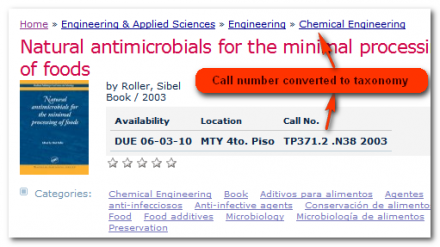 Support for Drupal 7 is ending on 5 January 2025—it’s time to migrate to Drupal 10! Learn about the many benefits of Drupal 10 and find migration tools in our resource center.
Support for Drupal 7 is ending on 5 January 2025—it’s time to migrate to Drupal 10! Learn about the many benefits of Drupal 10 and find migration tools in our resource center.This project is not covered by Drupal’s security advisory policy.
Auto-generates HILCC (Hierarchical Interface to the Library of Congress Classification) taxonomy terms for nodes that have LCC call numbers (library-assigned numbers like "QA 76.73 .P224 2005"). This can help you build a Drupal site that auto-organizes by a hierarchic subject tree.
For instance, items with different call numbers like QA76.73 and QA75 would be clustered under the Drupal category Engineering & Applied Sciences > Computer Science. The taxonomy terms are generated during node creation and update, and now optionally during cron runs and using node batch operations (from admin/content/node).
Possible uses are:
- Subject-based search, for instance using the Apache Solr module
- Subject-based breadcrumb, using the Taxonomy Breadcrumb module.
(For an example that uses all these modules, see the links to the demo below).
The module looks for call numbers in these places:
- CCK text fields (configurable)
- Biblio module nodes' "Call Number" field
- Any module implementing hook_hilcc_lcc($node), which should return an array with a single string containing an LCC call number, or FALSE on failure. See hilcc_hilcc_lcc() in hilcc.module for a sample implementation. One module that supports this is Millennium Integration (6.x-2.x branch).
What is HILCC?
HILCC is a hierarchic classification scheme developed originally at Columbia University Libraries, designed to offer library catalogs a way to easily cluster similar-subject items for navigation. HILCC is licensed under a Creative Commons BY-NC license.
Current implementations of HILCC in different data systems have been done at Columbia University Libraries, Cornell University Libraries, Serials Solutions (a library data services provider), and Tecnológico de Monterrey's Library.
Some code taken from yahoo_terms module.
Demo
You can see the module results in action at our Pasteur Library Catalog:
- a search for "Biology" which clusters items from an LCC number range.
- breadcrumbs showing the taxonomy tree Home > Sciences > Biology for a single item.
Note that the search result examples are from a site running the Apache Solr module.
Project information
- Module categories: Import and Export, Site Structure
- Created by janusman on , updated
This project is not covered by the security advisory policy.
Use at your own risk! It may have publicly disclosed vulnerabilities.












